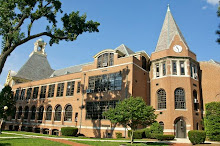I thought this was an interesting OP-ED from Washington Times, 10/23/08. What do you think?
Nailing down specifics on 'No Child'
by Michael J. Petrilli
Education is the neglected stepchild of this year's presidential race - very likely because the candidates are correctly reading the electorate. A recent poll found that only 1 percent of registered voters identified education as the issue most important to them. Yes, they've got plenty else on their minds. Still, it's a stunning change from 2000 when, during a time of peace and prosperity, school reform made it to the top of the nation's agenda.
One of the most significant outcomes of that election was bipartisan passage of President Bush's No Child Left Behind Act - a controversial law that is now overdue for renewal. Both Sen. John McCain and Sen. Barack Obama have promised to make changes to it, though each has been coy about the specific fixes he would propose.
That's not too surprising, either. NCLB is hugely unpopular with the bases of both political parties, with teacher unions abhorring its focus on test scores and conservatives ruing its expansion of federal powers. In the face of this widespread buyers' remorse, both candidates have been careful not to offer any specifics that would alienate key supporters.
But no such reticence is an option once Mr. McCain or Mr. Obama becomes president. Nor is NCLB going away. This massive statute houses most of the major federal programs in elementary-secondary education, as well as some $25 billion per annum in federal education aid. To move any school-reform initiative forward, indeed to do anything significant in K-12 education, the new president and Congress will have to update NCLB. And that means finding a political compromise.
That's plainly true for Mr. McCain, who would face a Democratic Congress. But Mr. Obama, too, will have to make a deal. Because so many members of his own party are loath to buck the unions, he will need to find Republican votes in order to get any NCLB reauthorization through Congress.
What could such a compromise entail? The best feature of NCLB is the transparency it has created around school performance. Because of annual testing in math and reading, and the reporting of test results for sub-groups as well as entire schools, communities now have tons more information with which to gauge their schools' effectiveness. The worst feature of NCLB is its heavyhandedness, labeling schools as failures even if just a handful of students perform poorly on state tests - and spelling out in excruciating detail the year-to-year cascade of sanctions that are supposed to be imposed on such schools.
How could the next president and Congress keep the good while getting rid of the bad? They should turn NCLB on its head, making it tight where today it's far too loose while loosening the parts that today are excessively tight.
Right now, NCLB micromanages the formula and timelines by which schools are labeled and sanctioned, yet it allows states total discretion over the academic standards and tests used to judge schools (and kids) in the first place. These should be flipped. Provide incentives for states to sign up for rigorous nationwide (not federal) standards and tests. Make the results of this testing publicly available, sliced every which way by school and group. But then allow states and districts (or private entities, such as GreatSchools.net) to devise their own school labels and ratings - and let them decide what to do with schools that need help.
This will enable parents, policy-makers, and taxpayers to compare schools in an apples-to-apples manner, across state lines, but will also empower states and communities to take the driver's seat again when it comes to determining which schools need help and how to intervene.
This solution won't please everyone. Some reformers will worry that, without stern mandates from Washington, some states will fail to hold troubled schools accountable. Some conservatives will complain about "national" testing. And some union leaders will still chafe at the transparency of school results and the possibility of tying student performance to teacher effectiveness.
But reasonable people on all sides of the issue will see that this approach is better aligned with Uncle Sam's skill set. After all, Washington is at least three or four steps removed from the operation of local schools. There's only so much policy-makers can do from Capitol Hill and the federal Education Department, whatever their intentions. It would be far better for the feds to focus on making school standards explicit and results transparent, and then allow the states, communities and expert educators to focus on how to reform schools that aren't making the grade. It might even remove some of the buyers' remorse that has come to be associated with NCLB.
Michael J. Petrilli, a former Bush administration official in the U.S. Department of Education, is vice president for national programs and policy at the Thomas B. Fordham Institute.
Welcome!
Welcome to Laurie Goodman's blog. I use this space to share news and opinions about education and schools in Ridgewood, the state of New Jersey and the nation, in addition to other issues I'm personally interested in. I invite you to share your thoughts, feelings, questions or opinions, too, by posting comments on any blog entry. Please observe basic courtesy -- keep your comments focused on issues, no personal attacks or bullying, please. Contact me directly at: lauriegood@mac.com
Subscribe to:
Post Comments (Atom)






2 comments:
I hope WHEN Obama is elected he figures out how to fix NCLB so that it can deliver on the promise that it once had.
I thought this was great article and the changes suggested make a lot of sense. I am confident that Obama will only improve education in this country.
Post a Comment